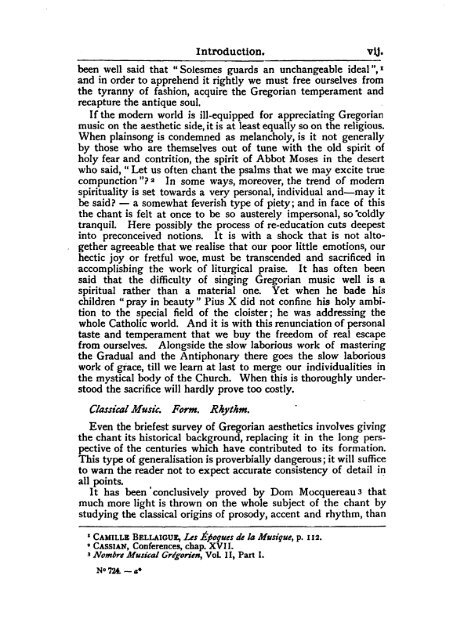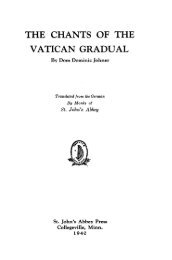Textbook of Gregorian Chant (1930) - MusicaSacra
Textbook of Gregorian Chant (1930) - MusicaSacra
Textbook of Gregorian Chant (1930) - MusicaSacra
You also want an ePaper? Increase the reach of your titles
YUMPU automatically turns print PDFs into web optimized ePapers that Google loves.
Introduction. vtf.<br />
been well said that "Solesmes guards an unchangeable ideal", 1<br />
and in order to apprehend it rightly we must free ourselves from<br />
the tyranny <strong>of</strong> fashion, acquire the <strong>Gregorian</strong> temperament and<br />
recapture the antique soul.<br />
If the modern world is ill-equipped for appreciating <strong>Gregorian</strong><br />
music on the aesthetic side, it is at least equally so on the religious.<br />
When plainsong is condemned as melancholy, is it not generally<br />
by those who are themselves out <strong>of</strong> tune with the old spirit <strong>of</strong><br />
holy fear and contrition, the spirit <strong>of</strong> Abbot Moses in the desert<br />
who said, " Let us <strong>of</strong>ten chant the psalms that we may excite true<br />
compunction"? 2 In some ways, moreover, the trend <strong>of</strong> modern<br />
spirituality is set towards a very personal, individual and—may it<br />
be said? — a somewhat feverish type <strong>of</strong> piety; and in face <strong>of</strong> this<br />
the chant is felt at once to be so austerely impersonal, so "coldly<br />
tranquil. Here possibly the process <strong>of</strong> re-education cuts deepest<br />
into preconceived notions. It is with a shock that is not altogether<br />
agreeable that we realise that our poor little emotions, our<br />
hectic joy or fretful woe, must be transcended and sacrificed in<br />
accomplishing the work <strong>of</strong> liturgical praise. It has <strong>of</strong>ten been<br />
said that the difficulty <strong>of</strong> singing <strong>Gregorian</strong> music well is a<br />
spiritual rather than a material one. Yet when he bade his<br />
children " pray in beauty " Pius X did not confine his holy ambition<br />
to the special field <strong>of</strong> the cloister; he was addressing the<br />
whole Catholic world. And it is with this renunciation <strong>of</strong> personal<br />
taste and temperament that we buy the freedom <strong>of</strong> real escape<br />
from ourselves. Alongside the slow laborious work <strong>of</strong> mastering<br />
the Gradual and the Antiphonary there goes the slow laborious<br />
work <strong>of</strong> grace, till we learn at last to merge our individualities in<br />
the mystical body <strong>of</strong> the Church. When this is thoroughly understood<br />
the sacrifice will hardly prove too costly.<br />
Classical Music. Form. Rhythm.<br />
Even the briefest survey <strong>of</strong> <strong>Gregorian</strong> aesthetics involves giving<br />
the chant its historical background, replacing it in the long perspective<br />
<strong>of</strong> the centuries which have contributed to its formation.<br />
This type <strong>of</strong> generalisation is proverbially dangerous; it will suffice<br />
to warn the reader not to expect accurate consistency <strong>of</strong> detail in<br />
all points.<br />
It has been conclusively proved by Dom Mocquereau3 that<br />
much more light is thrown on the whole subject <strong>of</strong> the chant by<br />
studying the classical origins <strong>of</strong> prosody, accent and rhythm, than<br />
1 CAMILLE BELLAIGUE, Les Apoques de la Musique, p. 112.<br />
3 CASSIAN, Conferences, chap. XVII.<br />
3 Nombre Musical Grtgorien^ VoL II, Part I.<br />
No 724L — a*
















